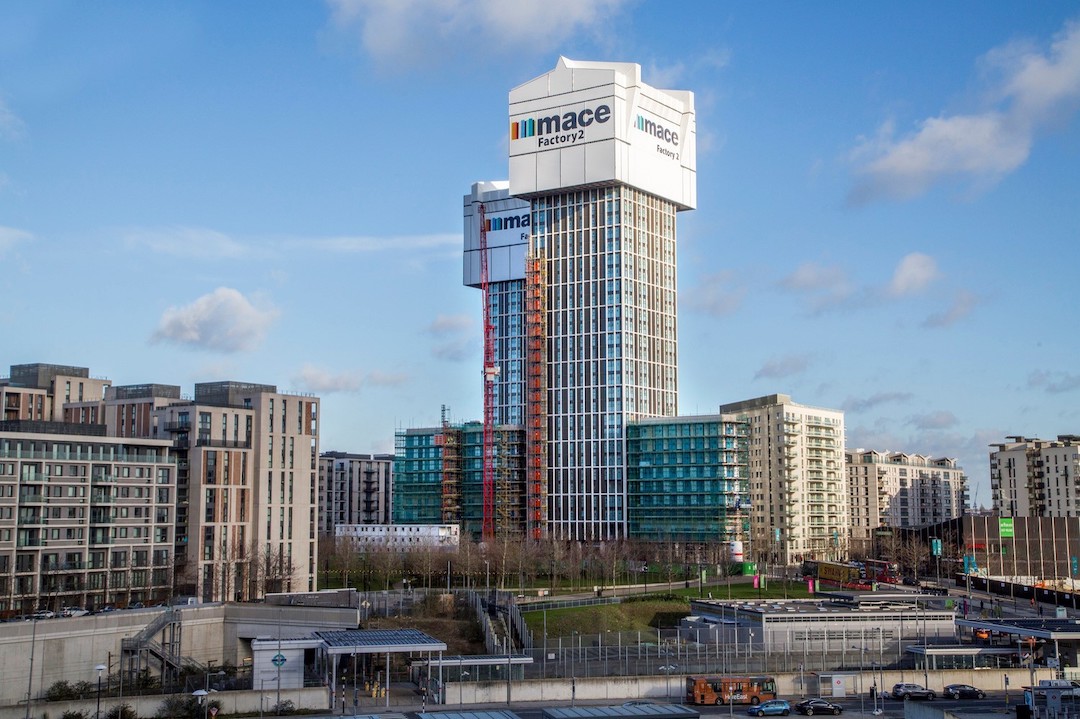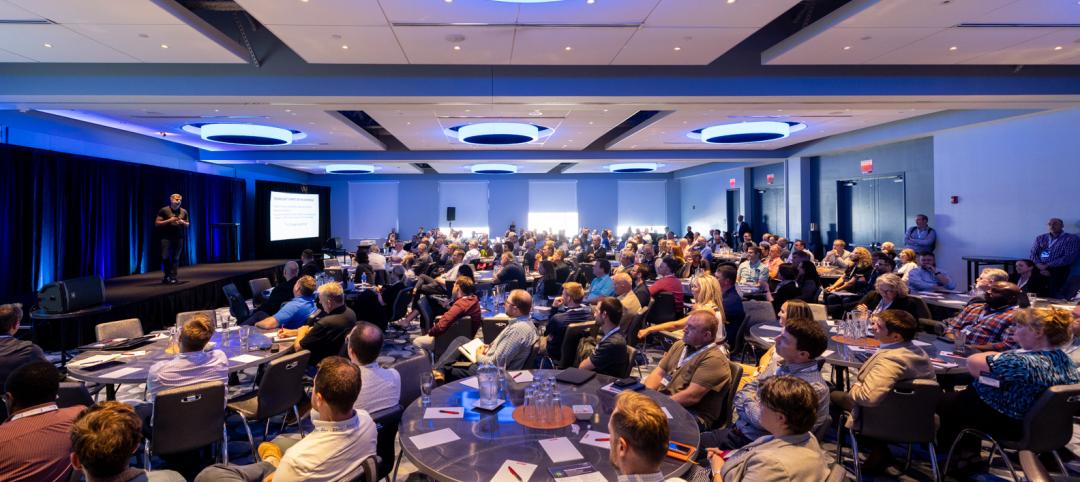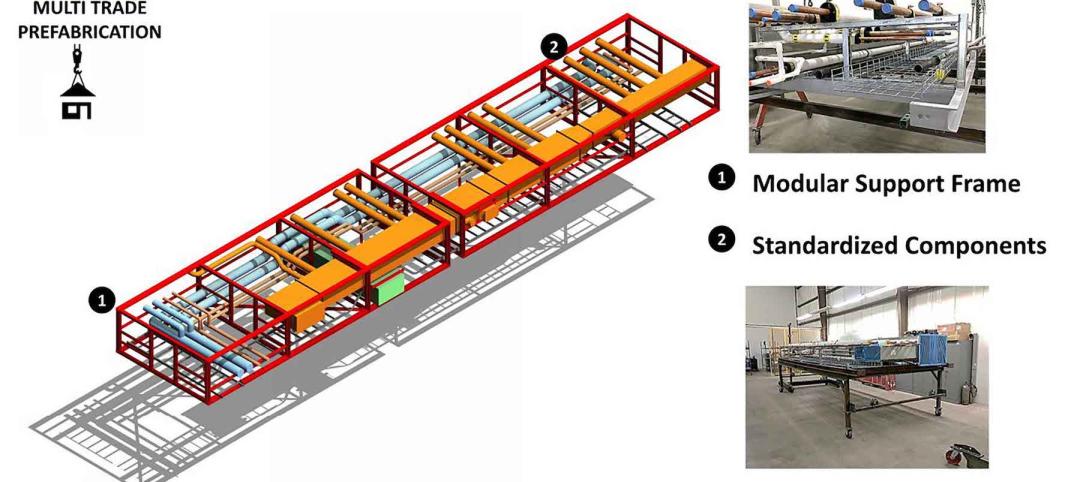Mace Group is London’s largest contractor, and has been associated with some of that city’s signature projects, including its 95-story skyscraper The Shard; the 443-foot-high cantilevered observation wheel known as London Eye; and Heathrow Terminal 5, which at nearly four million sf on 640 acres is the largest freestanding structure in the United Kingdom.
Since its inception in 1990, Mace has explored where production and construction might intersect. That inquest is suddenly urgent today, as U.K. cities will need 10,500 new homes to be built per month every year through 2038. To meet that demand, the country’s construction industry must rev up its productivity by 30%.
Recently, Mace took a step toward shifting from construction to production when it literally built factories on top of two under-construction residential towers in Stratford. Workers within those factories poured concrete, and assembled and installed prefab MEP systems, bathroom pods, risers, and façade components. The firm showcased its factory during a presentation at Autodesk University in London in June.
Skyscrapers rise with six-story prefab factories
The six-story factories each weighed 510 tons and were 35 meters wide, 41 meters long, and 33 meters high. Some of their spaces were dedicated to materials delivery, façade installation, and assembling sub-assemblies. The structural engineer Davies Maguire helped Mace figure out how the building would manage that weight load.
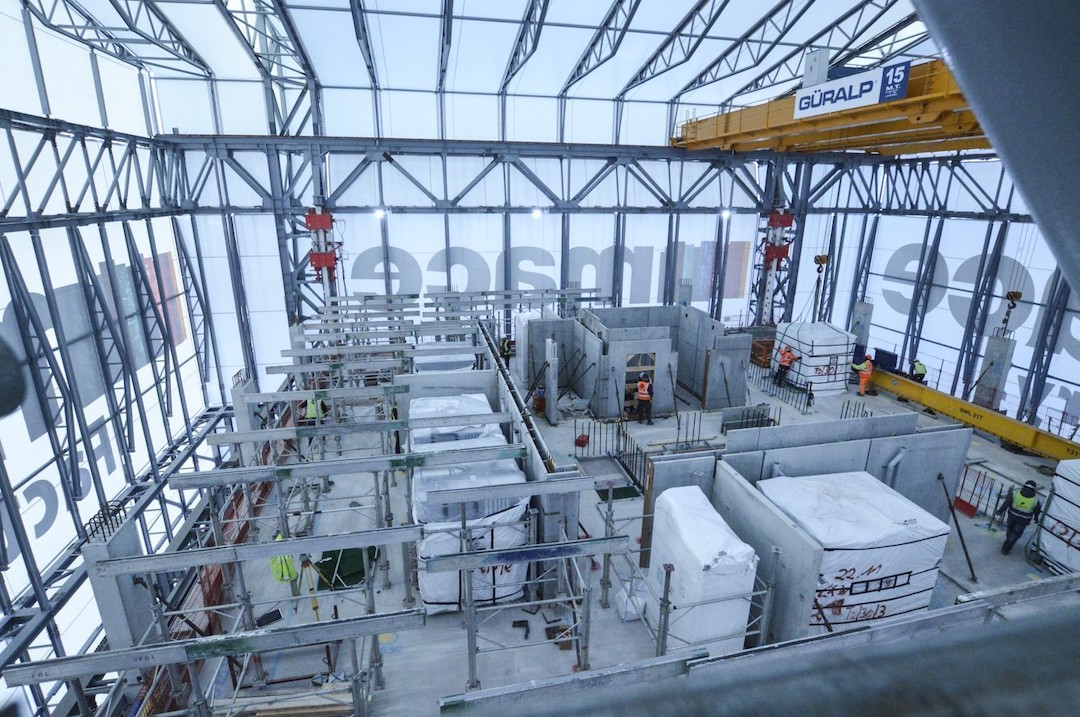 Photo: Mace Group
Photo: Mace Group
Matt Gough, Mace’s Director of Innovation and Work Winning, tells BD+C that the factories were “cost neutral” in that they eliminated the need for tower cranes, and increased productivity to the point where crews could complete 18 floors in 18 weeks. The factories reduced the project’s transportation by 40%, and its waste by 75% compared to a more conventional construction site. This project’s “gross value added” per worker, at £80 ($101.41) per hour worked, was higher than the U.K.’s average for construction and manufacturing.
“We changed the process for delivering high rises,” says Gough, even as it struggled at first to get some trades to work “in a different way.”
In January, Mace handed over the two residential towers to their developer, a joint venture between Qatari Diar and Delancey. Stratford is Mace’s sole project with onsite factories. The contractor is open to doing more projects like it in the U.K. and elsewhere (it has a construction management office in New York). Mace’s goal is to be “manufacturing” 85% of its projects 50% faster by 2022 via just-in-time logistics and sharper site management abetted by technology.
The contractor is doing modular construction on some projects, and intends to rely more on offsite prefabrication, which could result in safer jobsites with fewer workers needed.
How do you construct one floor of a building in just 55 hours? At N08, our project at East Village in Stratford, Mace used the 'rising factories' - an #innovative new #construction method - to deliver a step change in productivity and efficiency. Watch our latest video: pic.twitter.com/evIOsT3GTU
— Mace (@MaceGroup) June 13, 2018
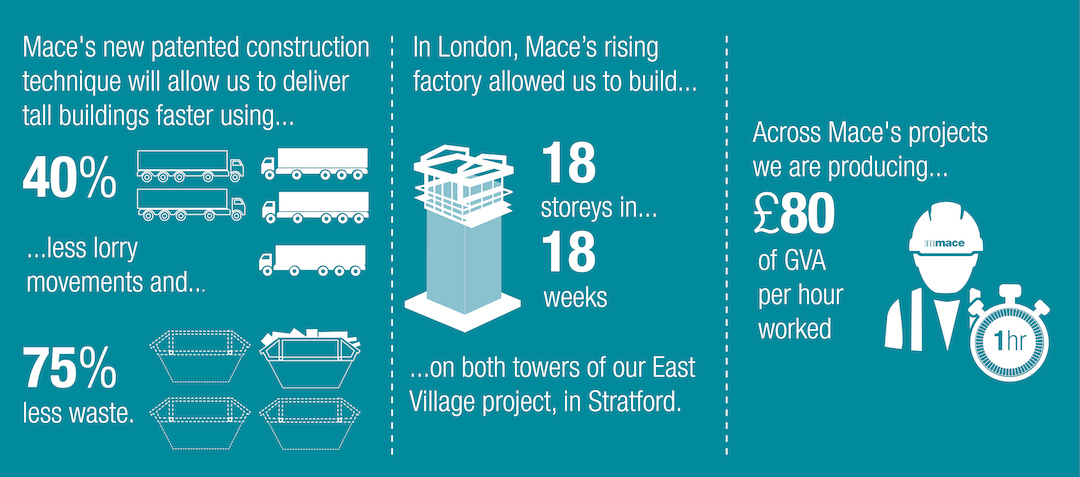 Infographic: Mace Group
Infographic: Mace Group
Related Stories
AEC Tech Innovation | Oct 8, 2024
New ABC technology report examines how AI can enhance efficiency, innovation
The latest annual technology report from Associated Builders and Contractors delves into how artificial intelligence can enhance efficiency and innovation in the construction sector. The report includes a resource guide, a case study, insight papers, and an essay concerning applied uses for AI planning, development, and execution.
3D Printing | Sep 13, 2024
Swiss researchers develop robotic additive manufacturing method that uses earth-based materials—and not cement
Researchers at ETH Zurich, a university in Switzerland, have developed a new robotic additive manufacturing method to help make the construction industry more sustainable. Unlike concrete 3D printing, the process does not require cement.
Airports | Aug 22, 2024
Portland opens $2 billion mass timber expansion and renovation to its international airport
This month, the Portland International Airport (PDX) main terminal expansion opened to passengers. Designed by ZGF for the Port of Portland, the 1 million-sf project doubles the capacity of PDX and enables the airport to welcome 35 million passengers per year by 2045.
Sustainability | Aug 14, 2024
World’s first TRUE Zero Waste for Construction-certified public project delivered in Calif.
The Contra Costa County Administration Building in Martinez, Calif., is the world’s first public project to achieve the zero-waste-focused TRUE Gold certification for construction. The TRUE Certification for Construction program, administered by Green Business Certification Inc. (GBCI), recognizes projects that achieve exceptional levels of waste reduction, reuse, and recycling.
Smart Buildings | Jul 25, 2024
A Swiss startup devises an intelligent photovoltaic façade that tracks and moves with the sun
Zurich Soft Robotics says Solskin can reduce building energy consumption by up to 80% while producing up to 40% more electricity than comparable façade systems.
Great Solutions | Jul 23, 2024
41 Great Solutions for architects, engineers, and contractors
AI ChatBots, ambient computing, floating MRIs, low-carbon cement, sunshine on demand, next-generation top-down construction. These and 35 other innovations make up our 2024 Great Solutions Report, which highlights fresh ideas and innovations from leading architecture, engineering, and construction firms.
AEC Tech Innovation | Jul 4, 2024
Caution competes with inevitability at conference exploring artificial intelligence for design and construction
Hosted by PSMJ, AEC Innovate in Boston found an AEC industry anxiously at the threshold of change.
Contractors | Jun 4, 2024
Contractors expect to spend more time on prefabrication, according to FMI study
Get ready for a surge in prefabrication activity by contractors. FMI, the consulting and investment banking firm, recently polled contractors about how much time they were spending, in craft labor hours, on prefabrication for construction projects. More than 250 contractors participated in the survey, and the average response to that question was 18%. More revealing, however, was the participants’ anticipation that craft hours dedicated to prefab would essentially double, to 34%, within the next five years.
AEC Tech | Apr 30, 2024
Lack of organizational readiness is biggest hurdle to artificial intelligence adoption
Managers of companies in the industrial sector, including construction, have bought the hype of artificial intelligence (AI) as a transformative technology, but their organizations are not ready to realize its promise, according to research from IFS, a global cloud enterprise software company. An IFS survey of 1,700 senior decision-makers found that 84% of executives anticipate massive organizational benefits from AI.
AEC Innovators | Apr 26, 2024
National Institute of Building Sciences announces Building Innovation 2024 schedule
The National Institute of Building Sciences is hosting its annual Building Innovation conference, May 22-24 at the Capital Hilton in Washington, D.C. BI2024 brings together everyone who impacts the built environment: government agencies, contractors, the private sector, architects, scientists, and more.


